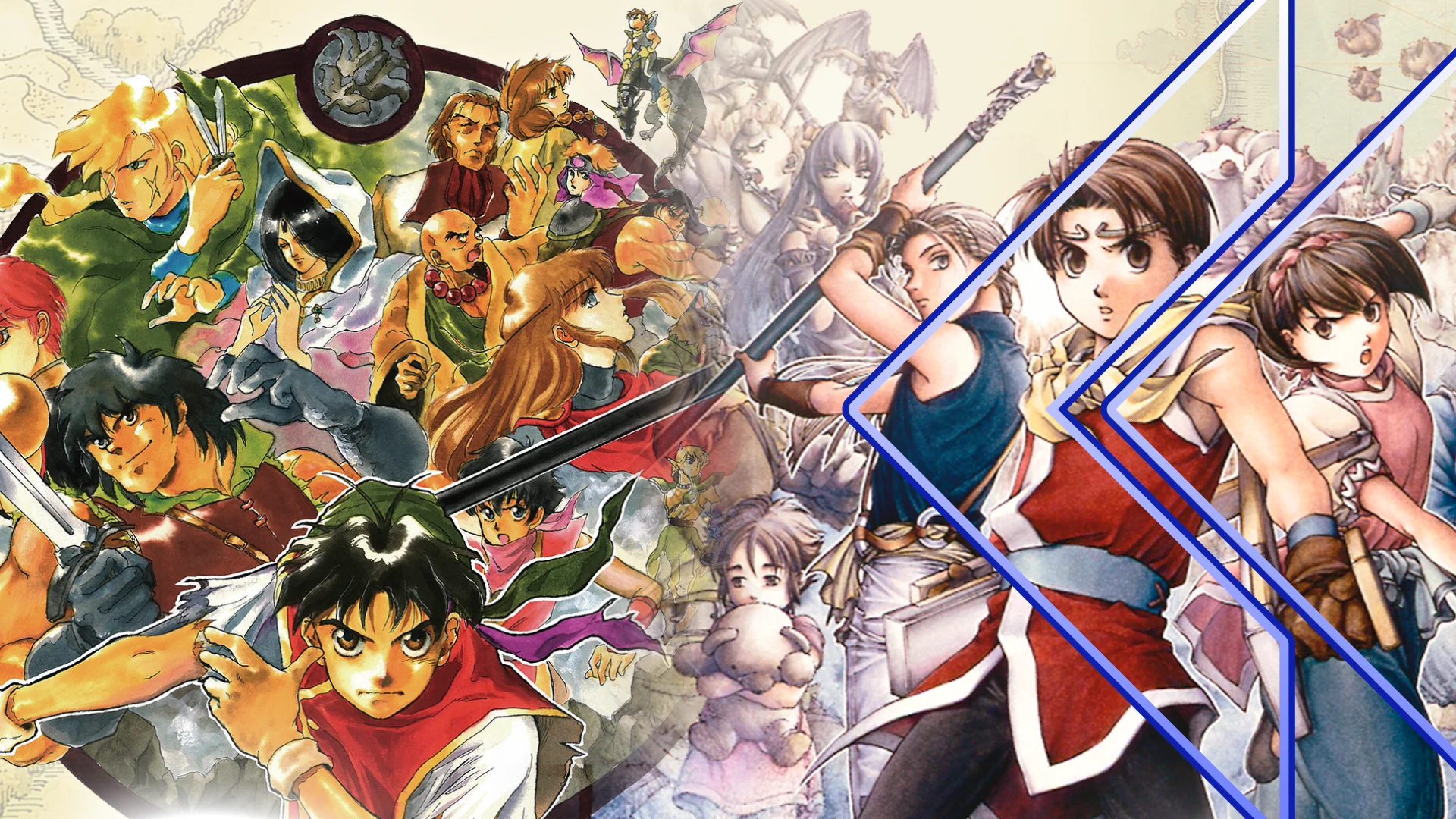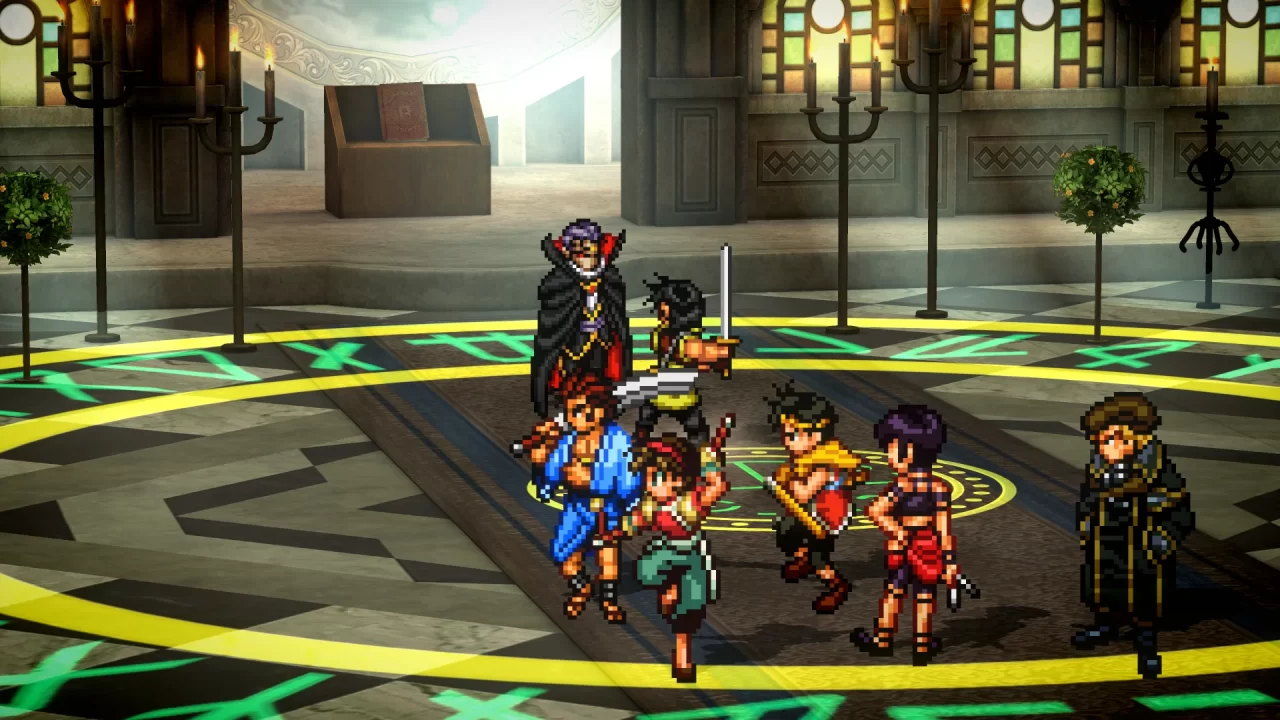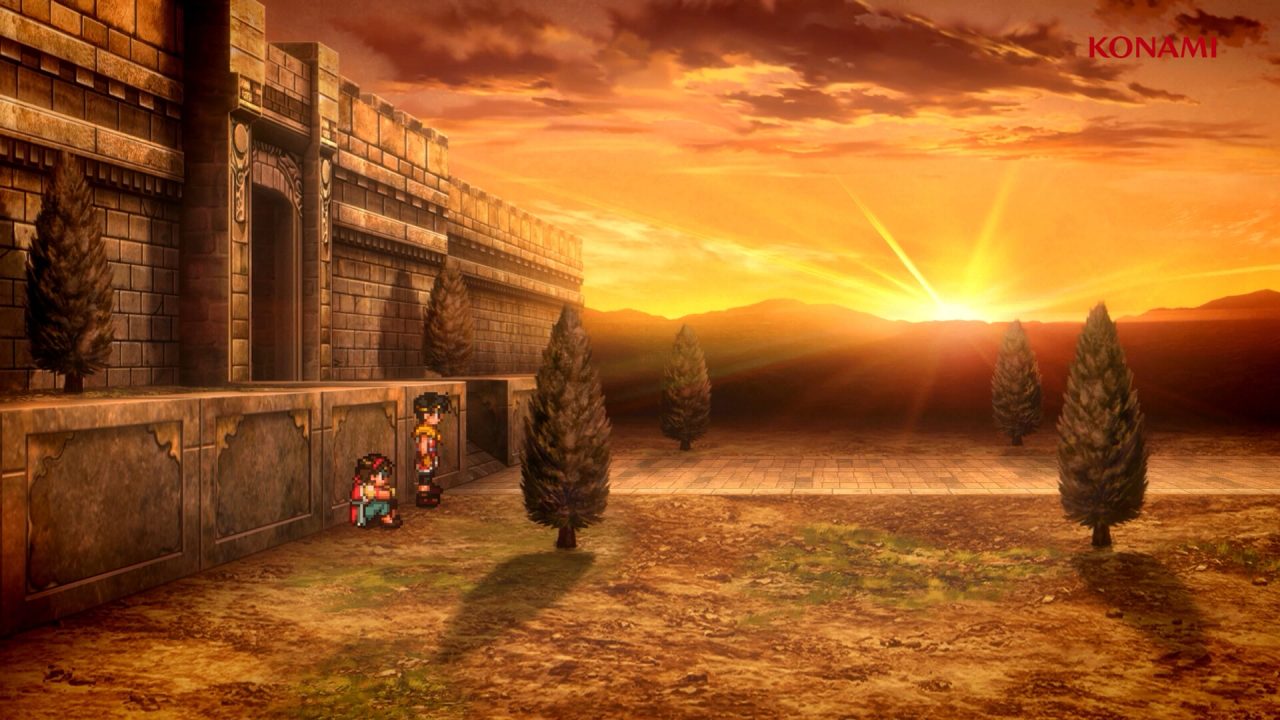Rob White
I’ve loved having the opportunity to replay Suikoden II and play Suikoden for the first time with the recent remaster. It has confirmed to me that Suikoden II is still a fantastic game that holds its own even by modern standards. The first game very much feels like a prototype for Suikoden II in multiple ways, using many of the same plot points and mechanics that are in its sequel, just not as fully fleshed out or as well realised. Is the first Suikoden also in my top 10 of all time? No, it’s not. Is the second game staying in my top 10 of all time? Absolutely, yes.
Suikoden II has always been a very important game for me. Playing it originally during my formative years, I’d say it is a contributing factor to how my tastes for video game stories and love for the fantasy genre generally have developed. I remember wanting to play it so badly based just on seeing the beautiful cover art in game shops back in the ‘90s. I barely knew anything about it, but was so excited to dive in when I received a copy from my Dad for my birthday, a copy I still own to this day. Back then, I lost the opportunity to see the True Ending – I missed Mukumuku, and even if I had recruited him, I was blissfully unaware that by letting characters die in the war battles I’d also be locked out of that ending. Unfortunately, Maximilian didn’t last long in that play through. I didn’t really mind though; I was utterly engrossed in the story, and upon completion I felt like I’d experienced something incredible – a story unlike anything else in gaming (at that time, anyway), and a cast of characters I’d grown to know and love, and I had my Dad to thank for it.
I decided, with the remaster, that this was the time I’d see that True Ending. I knew more about the game and felt confident I’d do it this time. I finally had it in sight just a couple of weeks ago. My Father passed away before Christmas last year, just a few short months before these remasters were released. It just so happened that on the day I completed this playthrough of Suikoden II for only the second time in my life, the game he bought for me as a child, other members of my family were across the country spreading his ashes in the countryside at a place he loved. I stopped gaming in the morning as I approached the final dungeon; I wanted to take some time to myself. I went and sat on the beach and had a beer in memory of him, and it was there that this coincidence occurred to me. I went back home, completed the game and took in that true ending, feeling like something very memorable just happened. Sure, the rekindling of the friendship between Riou and Jowy and the resurrection of Nanami is a little easy and convenient, but I loved the sentiment behind Riou turning down the responsibility of running the new country.
It made me think about how we move on, after experiencing such a life-changing event. Can we go on in the face of such prolonged trauma? Can we put the past behind us, grieve for those we lost and get to a point where we can enjoy life with those we love? Is it okay to say ‘no’ to others in order to take care of your own wellbeing? The true ending, whilst exploring questions like these, also answers them all positively with a resounding yes. It felt special, and dare I say fateful, that I’d achieved this ending and watched it on the day my dad’s ashes were released back to nature. I hope both we can all move on, and I’m thankful that Suikoden II can mean even more to me than it did before, acting as something of a connector between me and my father.
Aleks Franiczek
I’m usually resistant to hype for upcoming videogame releases, yet I can hold onto hype for old classics I’ve yet to play for years. That was the case for the first two Suikoden games (particularly the second) and so this remaster collection was probably my most hyped release of 2025. The question is whether they could live up to over a decade of anticipation.
I’ve heard the first Suikoden described as a prototype for its superior sequel. While I understand where that notion is coming from, I also think it’s unfair. Suikoden is a blast. It’s conceptually ambitious but modest in its scope. It’s poorly balanced but so breezy that it barely matters. And key story moments are contrived while still feeling successful in their character development and dramatic impact. I still can’t believe how much I did in this game in a mere 20 hours, and how epic and fun (even when silly) it was the entire time.
I loved Suikoden II, but having played it last in the Murayama-penned trilogy, I was surprised to find aspects of it weaker than its predecessor and sequel—even if it’s ultimately the strongest of the bunch. Its first act is one of the best setups for an RPG story ever, so the first impression floored me. I think it’s partially because it starts damn near perfectly that flaws in the pacing, character development, and balance through the second half bothered me. Progression isn’t as smooth as Suikoden, and the worldbuilding and Stars of Destiny don’t have the same depth as in Suikoden III. However, where Suikoden II truly shines is in the heart behind its central character dynamics. I was deeply invested in Riou, Nanami, Jowy, Viktor, Flik, Shu and Luca Blight, who are all captivatingly portrayed through subtle writing and gorgeous sprite animations.
Paul Dennis
In the late ’90s, I had a babysitter than I only went to a few times. Her teenage son, Joseph, introduced me to Suikoden by dropping me into a save file just moments before Viktor rescues the party in Lenankamp. I remember immediately thinking Viktor was just the coolest dude, and I wanted to play the game from start to finish right then and there. Unfortunately, I never saw him again, and it would be years before I played the first game again. But I found Suikoden II at a video store, and before long, it became an escape from the less pleasant aspects of my childhood; I grew to not only love Suikoden II, but also appreciate it for the shelter it afforded me. I adored it, but wanted to play Suikoden badly, so when I saw that cringy cover art in a case of discount games at a Winn-Dixie in North Carolina, I went from a strong sense of secondhand embarrassment to extreme elation when I realized what game I was looking at. I begged my mom to buy it for me, and quickly took it home to binge it. The warmth I felt when I got to the only part of Suikoden I’d experienced at that point, while having the context of the second game, was immeasurable. I was home again. This series is about as close to my heart as it could be without killing me, so when I woke up for work on September 16, 2022, and saw that the remaster had been announced, I literally wept tears of joy.
Though not without their flaws, Suikoden I & II are, to me, still standout RPGs. The experience just hasn’t been replicated by any game outside of the series to date. It’s hard to call the story of Suikoden “rich” but even with the minimalist writing and worldbuilding, the game somehow feels hefty, consequential. It manages to evoke a number of emotions over the brisk 15 hour run time that range from melancholic and mournful to triumphant and exciting. The duel between Tir and Teo is one of the more undeniably emotional moments. No animosity between the two, just a strong sense of duty on both sides. Between that and Futch’s heartbreaking moment with Black, I can’t help but feel moved by the game’s masterful exploration of loyalty and sacrifice. That tradition is continued in Suikoden II with scenes like the fight that pits Jowy and the hero against Gordeau, and the numerous conversations with Nanami where she tries, but usually fails, to convince her brother, the hero, that war is not the responsibility of children.
Suikoden II takes everything that Suikoden did right and amplifies it, while dulling the rough edges of the first entry. It is a phenomenal display of learning one’s lessons and applying them to the next piece of work. As a creative person myself, I am envious of their ability to so honestly and accurately identify what they did wrong, what they did right, and iterate on their findings. Suikoden II has greatly improved rune mechanics, inventory, art, pacing, script, and story, and is the standard against which every RPG game I’ve played since my childhood has been weighed. But I think its greatness is most accurately judged while including the context of the first game. They’re synergistic. I don’t feel that it matters what order you play them in, as long as you play them both.
Zach Wilkerson
My colleagues above share emotions and sentiments that get to the heart of Suikoden: the personal, the family. They’re all touching, and at this point it almost seems absurd for me to sing Suikoden I and II’s praises yet again, especially in the face of those stories. After all, I’ve done it dozens of times on the podcast; I dumped just as much on the remaster (even if I don’t think it went far enough). Suikoden II is still an all-time favorite, and Suikoden is still a game I just can’t put down every time I pick it up.
So I’ll keep it simple: if you’re reading this and you haven’t played these games yet because they’re too simple or they’re overhyped, just do it. That’s all.






